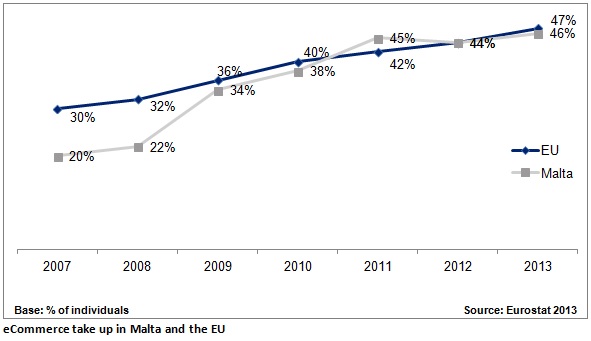National eCommerce Strategy (2014 - 2020)
Despite the economic downturns that have afflicted Europe and beyond, eCommerce continues to flourish and it is no big secret that it is growing at a much faster rate than traditional retail channels, especially in emerging markets. eCommerce is radically changing the way business is conducted and it is invading all areas of economic activity in one way or another.
Online shopping is fast becoming popular with the Maltese, increasing from 34% to 46% in five years and almost in line with the EU average of 47%. Notwithstanding this, Malta trails far behind the UK at 77%, the best performing market in the EU for this indicator, indicating that there is still much room for growth in this area. Recent data released by the NSO estimates that around €40 million are spent each year by the Maltese on internet shopping. However, according to Eurostat 2013, only 7% buy from local sites, whilst 44% shop from other EU countries. This could partly be attributed to the lack of local businesses selling online, with only 12% of Maltese enterprises claiming to have engaged in online selling in 2013, amongst other factors.

For the purpose of this strategy, eCommerce is the sale or purchase of goods and services, over computer networks, generally over systems specifically designed for that purpose. For a transaction to be classified as eCommerce, the payment and the ultimate delivery of the goods or services does not have to be conducted online.
This strategy addresses B2B, B2G and B2C eCommerce and it:
- identifies a set of measures to sustain and grow the local eCommerce market on both the supply and demand side;
- identifies a set of initiatives to assist and further drive the adoption of eCommerce by those business sectors having the potential to capitalise on web technologies to penetrate foreign/niche markets;
- considers those vulnerable industries that may need to undergo structural changes as a result of the widespread adoption of eCommerce by Maltese consumers;
- reviews and identifies opportunities whereby Malta may attract business activity operating or supporting the global eCommerce markets.
The measures developed under this strategy seek to encourage eCommerce adoption only when a clear business case for eCommerce exists, and takes into account the following principles:
- the horizontal nature of eCommerce;
- the broad range of possible applications of eCommerce across product or service value chains;
- the diversity of enterprises that may benefit from eCommerce; and
- the increasing deployment of B2B solutions across value chains, having the potential of improving the competitiveness of enterprises all along the digitised value chain.
Attachments:
Internet and eCommerce use by Individuals
(882.04 KB)
MCA National eCommerce Strategy
(609.68 KB)
Taxation of electronically supplied services
(205.95 KB)





